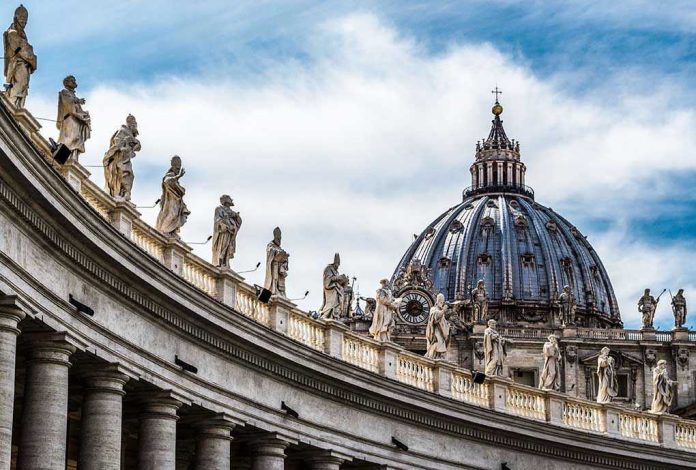
An unthinkable act of desecration at St. Peter’s Basilica has ignited global outrage, spotlighting alarming trends of disrespect toward sacred traditions and the breakdown of security at the heart of Western civilization.
Story Highlights
- A man urinated on the Altar of Confession at St. Peter’s Basilica during Holy Mass, shocking hundreds of worshippers.
- The incident follows a string of vandalism and protest acts at the Vatican, exposing serious security lapses.
- Vatican authorities have yet to release details or an official response, fueling concern among religious communities.
- Broader societal issues—mental health, migration, and erosion of respect for tradition—are fueling debate on protecting religious sites.
Outrage at the Heart of Catholicism: Desecration During Mass
On the morning of October 10, 2025, worshippers at St. Peter’s Basilica in Vatican City were stunned when a man brazenly climbed onto the sacred Altar of Confession and urinated on it during Holy Mass. The incident unfolded before hundreds of faithful and tourists, instantly drawing sharp reactions from witnesses and religious leaders. Security officers intervened within moments, removing the perpetrator from the basilica. Yet, as video footage went viral online, the Vatican’s silence and lack of details regarding the man’s identity or motive have left many searching for answers.
This shocking act is not an isolated event. St. Peter’s Basilica, home to the tomb of St. Peter and the focal point of Catholic worship, has faced a troubling pattern of vandalism and protest in recent years. In February 2025, another man climbed the altar and threw candelabras to the ground, while in June 2023, a protester undressed and climbed onto the altar to display a political message. These incidents, occurring in full view of the public, reveal a disturbing breakdown in security and a rising disregard for the sanctity of religious spaces. Despite increased traffic and heightened security post-pandemic, the open nature of Mass still allows for such breaches, raising serious questions about current safety protocols.
Stakeholders and the Erosion of Tradition
The primary stakeholders in this desecration are the Vatican authorities—tasked with safeguarding sacred sites—the Catholic clergy and laity, and the wider religious community. The identity and motives of the perpetrator remain undisclosed, leading to speculation regarding protest, mental health issues, or even broader social unrest. While Vatican security responded swiftly, the lack of a formal statement from the Holy See Press Office has only fueled anxiety among the faithful. This vacuum of accountability underscores a larger issue: the erosion of respect for tradition and the gradual normalization of acts that attack the core values of Western civilization.
The Vatican holds sovereign authority over the basilica and its security, but recent events have exposed vulnerabilities. As decision-makers deliberate on next steps, the Catholic community is left to grapple with uncertainty and concern over future incidents. The incident’s symbolism—desecrating the altar during Mass—magnifies its impact and highlights the growing tension between public access and the preservation of religious sanctity.
Security Concerns and Societal Implications
The viral spread of video evidence has intensified scrutiny on Vatican security measures. Reports indicate an increased security presence following the incident, but the basilica remains open to the public. With no official comment from the Vatican as of October 12, and the perpetrator’s fate unclear, questions persist about whether current protocols are sufficient to prevent future attacks. The short-term effect has been widespread shock and outrage, while the long-term implications may include stricter access controls, greater surveillance, and calls for reform to protect religious heritage.
Beyond immediate security concerns, this act of desecration is emblematic of broader societal shifts. Experts and commentators point to factors such as migration, mental health crises, and alienation as underlying causes, though no direct evidence links these motives to the perpetrator. The incident has reignited debates on the need for compassion and mental health support, but also on the importance of defending tradition, family values, and the moral foundations of society. As similar acts become more frequent, the challenge to uphold and defend the sacred grows more urgent.
Economic and social impacts are also on the horizon. If security concerns persist, tourism to the Vatican could decline, affecting local economies and diminishing the role of religious pilgrimage. Politically, the incident has fueled discussions on migration, public order, and the capacity of Western institutions to defend their values against growing threats. The Vatican’s response—or lack thereof—will set a precedent for religious institutions worldwide facing similar challenges.
Expert Analysis and The Path Forward
Security analysts advocate for enhanced screening and surveillance at major religious sites, warning that current measures may be inadequate against evolving threats. Church historians underscore the symbolic gravity of desecration at the Altar of Confession, while sociologists and theologians see the act as symptomatic of deeper societal tensions. Diverse viewpoints abound, with some linking the event to migration and unrest, and others urging greater compassion. Still, the conservative consensus remains clear: defending tradition, faith, and the integrity of sacred spaces is paramount.
Reliable reporting from Catholic World Report, Brut Media, and EWTN Vatican confirms the essential facts of the incident and highlights the urgent need for action. With no contradictions in the core narrative, the focus shifts to solutions—strengthening security, reaffirming values, and holding those who desecrate sacred sites accountable. As the Vatican and broader Western civilization face these challenges, the imperative to defend tradition and faith against absurdity, disrespect, and overreach has never been greater.
Sources:
Man desecrates altar of St. Peter’s Basilica
Man pees on St. Peter’s Basilica Altar of Confession
St. Peter’s Basilica Altar Desecration 2025



